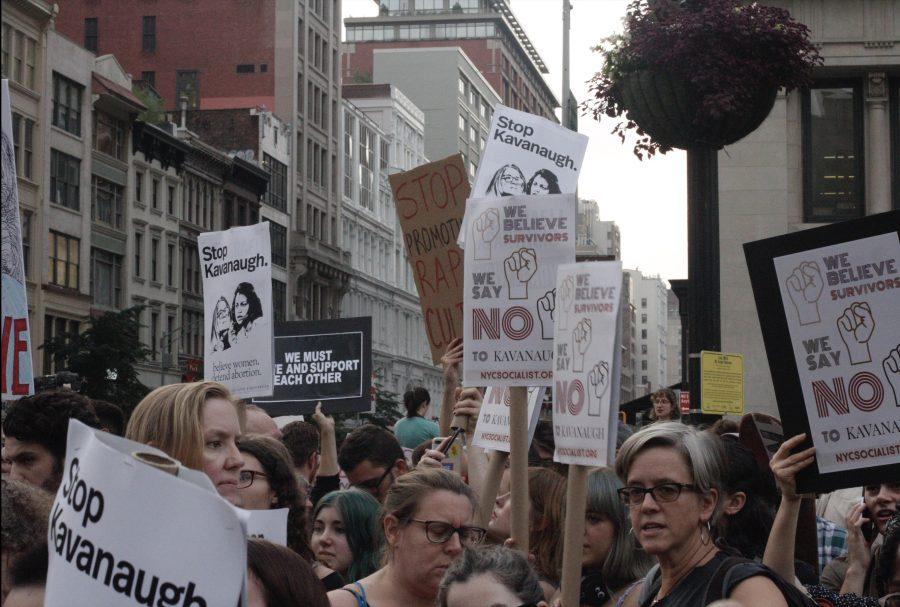Demonstrations against President Donald Trump’s controversial Supreme Court nominee, Brett Kavanaugh, have continued to take place in spite of his confirmation on Oct. 6. Last week, NYU students played a major part in the opposition, participating in a weeklong movement organized by the National Lawyers Guild called Strike Against Kavanaugh.
Alex Petkanas and Justine Medina, second-year law students at Brooklyn Law School, helped organize a walk out last week along with the National Lawyers Guild, gathering in Washington Square Park to protest Kavanaugh’s confirmation as part of a of a larger movement called Strike Against Kavanaugh.
The national movement held multiple events throughout the week, ending on Friday. It does not recognize Kavanaugh as a legitimate member of the U.S. Supreme Court, and calls for any member running for Congress in November to commit to impeaching Kavanaugh.
As part of the week’s schedule of events, second-year Brooklyn Law School students Alex Petkanas and Justine Medina helped organize a class walk-out and march in Washington Square Park on Wednesday, attended by dozens of NYU Law students.
“The aim of the rally was to build solidarity amongst community members who are united behind demanding the impeachment of Brett Kavanaugh,” Petkanas and Medina said in an email to WSN. “The rally not only helped provide many with hope, we also got our message out to hundreds of non-student organizers who joined us.”
In addition to NYU and Brooklyn Law students, demonstrators included students from other New York City law schools such as Cardozo School of Law and Columbia Law School.
Nikta Daijavad and Cara Hume, NYU School of Law second-years and co-presidents of NYU Law Women, were both present at the rally which included about 100 students, according to Hume. Due to the future implications of Kavanaugh’s confirmation on women’s reproductive rights, namely, the potential overturning of Roe v. Wade, those involved in the rally feel it is essential to continue the fight against his appointment.
“Our focus in the rally was on the implications Kavanaugh’s confirmation has on women, on survivors of sexual violence and on reproductive rights,” Hume said.
Daijavad believes that law students are the ones who should be at the forefront of the movement.
“It was really important to us that this walk-out was led by law students,” Daijavad said. “We as lawyers have an obligation to shape the law in a positive way and we felt like we were uniquely situated in order to be leading a conversation about this.”
In addition to their protests, activists have reached out to government representatives, although they have been slow in responding to these growing student-led movements, according to Petkans and Medina. A few politicians have expressed interest in supporting them, but only after the midterm elections.
“Democratic candidate Mal Hyman has endorsed us, but so far, we have no official endorsements from elected officials,” Petkanas and Medina said. “We are lobbying elected officials who have called for renewed investigation, packing the courts and potential impeachment.”
Essentially, Strike Against Kavanaugh hopes to have him impeached now that he has already been appointed. Through organizing political support prior to the midterm elections in November, they hope to elect officials that are willing to carry this out.
Organizations have been faster to respond, with several of them officially endorsing the movement, including student organizations at NYU School of Law, including NYU School of Law RISE Indivisible, Law Women, Women of Color Collective and Unemployment Action Center.
While the NYU administration hasn’t officially endorsed the strike, many faculty members have expressed their support to the students.
“During the walkouts, a few professors held classes off campus,” Hume said. “The dean of student affairs was very supportive of the walk out, and the dean of the law school circulated an email to the faculty members letting them know about the walkout.”
Nearly a week after the walk out, NYU Law students remain committed to the Strike Against Kavanaugh. The movement shows that although his confirmation may have felt like a defeat to many, some believe efforts to stop Kavanaugh must be as unrelenting as ever.
“No matter what we do, we do not want to normalize Brett Kavanaugh’s confirmation to the Supreme Court,” Daijavad said. “We very much recognize that his presence on the Supreme Court continues to send a message to women in this country that their stories and experiences don’t matter and we don’t want that to ever become normal. We want to continue drawing attention to that in as many ways as we possibly can.”
Email Amasha Nanayakkara at [email protected].


























































































































































